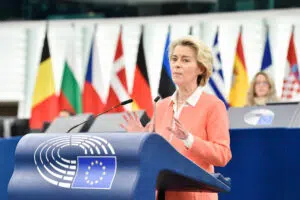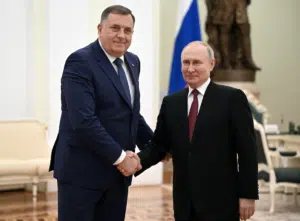from the correspondent in Strasbourg – Now the light is fully green: “we will decide to recommend to the Council to open accession negotiations with Bosnia and Herzegovina,” European Commission President Ursula von der Leyen announced today (March 12) in her address to the plenary session of the European Parliament during the debate on the preparation of the March 21-22 European Council. “The message coming from Bosnia and Herzegovina is clear. So our message must be clear too. The future of Bosnia and Herzegovina lies in our Union,” she added.

After the trip late in January with the prime ministers of Croatia, Andrej Plenković, and the Netherlands, Mark Rutte, the EU Commission chief pushed the Commission to work to present the report on Sarajevo’s steps since the December decision at the last European Council to start accession negotiations “once the necessary degree of compliance with the accession criteria has been achieved.” Speaking to MEPs, von der Leyen anticipated the points of the report on Bosnian progress: “It is a factual analysis of the latest developments. And it draws a very clear picture. Since we granted candidate status [in December 2022, ed.], Bosnia and Herzegovina has taken impressive steps forward,” she said. In other words, “more progress has been achieved in just over a year than in over a decade,” the Commission’s number one assured, giving some examples.
First, Bosnia and Herzegovina “first, Bosnia and Herzegovina has now fully aligned with our foreign and security policy, which is crucial in these times of geopolitical turmoil.” In addition, “the country is adopting important laws,” such as the prevention of conflict of interest, “which had stalled for seven years,” and one on combating money laundering and terrorist financing. A reference was also made to migration management, which “continues to improve with negotiations on a Frontex agreement ready to begin after the Presidency endorsed the negotiating framework.” Finally, the Bosnian Ministry of Justice “has agreed to include in the domestic criminal records the judgements of the International Criminal Tribunal for the former Yugoslavia,” and “the new Peacebuilding Steering Committee has just become operational.” “More progress is needed to join our Union. But the country is showing that it can deliver on its membership criteria, and on its citizens’ aspiration to be part of our family,” President von der Leyen assures, passing the ball to the Council.
Bosnia and Herzegovina’s EU accession path
Bosnia and Herzegovina’s journey towards the European Union began on February 15, 2016, with the official submission of its membership application. For more than six years, no positive response came from EU institutions because of the country’s near-disastrous situation on the base conditions (Copenaghen criteria) for being considered a formal candidate. However, over the past two years, signs of confidence have intensified, especially from the EU executive and its president, given the risks of Russian destabilization of a very delicate country and region in the heart of Europe.
The recommendation to the Council to grant Bosnia and Herzegovina candidate status for EU membership arrived with the presentation of the 2022 Enlargement Package, accompanied by a particularly passionate speech in Sarajevo by von der Leyen during her trip to the Balkan capitals to announce the strong support from Brussels. After assessing the Commission’s opinion, the EU Leaders’ Summit on December 15, 2022, gave the green light to grant Bosnia and Herzegovina the status of candidate country for EU membership while emphasizing the need to implement crucial reforms in the areas of the rule of law, fundamental rights, strengthening of democratic institutions, and public administration.
After becoming the eighth candidate country for accession in the EU enlargement process, Bosnia and Herzegovina continued to push on its path to the Union. Thanks to the (albeit limited) progress made by Brussels in the 2023 Enlargement Package, the EU Commission decided to include a recommendation to the European Council to launch accession negotiations for Sarajevo “once the necessary degree of compliance with the accession criteria has been achieved.” In other words, there was a recommendation, but with a foregone conclusion that the leaders summit would await new positive news on the front of the 14 priorities outlined by the Commission (of which only two have been completed) to give a response. That’s how it went at the last European Council in December, with the decision to start negotiations with Bosnia and Herzegovina, without indicating an actual start date.
The Republika Srpska hurdle
Yet the path of Bosnia and Herzegovina’s rapprochement with the Union is made particularly difficult by the president of Republika Srpska, Milorad Dodik, who has championed a secessionist project from October 2021. The goal is to remove itself from the control of the central state in key areas such as the military, tax system, and judiciary, more than 20 years after the end of the ethnic war in Bosnia and Herzegovina. The European Parliament has evoked economic sanctions. After the harsh condemnation conviction of secessionist attempts by the Serb-majority entity in Bosnia (with a bill to establish an autonomous High Judicial Council), Bosnian leaders gathered in Brussels in mid-June 2022 to sign a charter for stability and peace, focused primarily on electoral and constitutional reforms in the Balkan country.

From left: Republika Srpska President, Milorad Dodik, and Russian autocrat, Vladimir Putin, at the Kremlin on May 23, 2023 (credits: Alexey Filippov / Sputnik / Afp)
Concerns have become increasingly real since late March 2023, when the government of the Bosnian Serb entity presented a draft law to establish a register of foreign-funded associations and foundations. The so-called law on ‘foreign agents’ is similar to the one adopted by Moscow in December 2022 and was approved in late September by the National Assembly in Banja Luka amid sharp criticism from Brussels. In parallel, the process of adopting amendments to the Criminal Code reintroducing criminal penalties for defamation has also advanced. Following the proposal – also in late March – the law entered into force on August 18 and now provides for fines of 5,000 to 20,000 Bosnian marks (2,550 to 10,200 euros) if defamation occurs “through the press, radio, television, or other public media, during a public meeting, or otherwise.” The European External Action Service (EEAS) and the EU delegation in Sarajevo attacked Banja Luka, highlighting that the two laws “have had a frightening effect on freedom of speech in Republika Srpska.”
In addition to the secessionist provocations, there is the issue of the relationship with Russia after it invaded Ukraine. As early as September 20, 2022, Dodik traveled to Moscow for a bilateral meeting with Putin after provoking Western partners about the illegal annexation of Russian-occupied Ukrainian regions. Provocations that continued at the beginning of January 2023 with the award to the Russian autocrat the Order of Republika Srpska (the highest honor of the Serb-majority entity in the Balkan country) – in recognition of “patriotic concern and love” toward Banja Luka’s demands – on the occasion of the National Republika Srpska Day, an unconstitutional holiday under Bosnian law. As if that were enough, Dodik went on a second trip to Moscow on May 23, while in Brussels, misgivings emerged about the Union’s failure to respond with sanctions. EU sources revealed to Eunews that a framework of restrictive measures has existed for some time now ready to be implemented, but Viktor Orbán’s Hungary is not giving the green light. Any such foreign policy action requires unanimity in the Council.
Find more insights on the Balkan region in the BarBalkans newsletter hosted by Eunews
English version by the Translation Service of Withub


![Il presidente della Repubblica, Sergio Mattarella, con la presidente della Commissione europea, Ursula von der Leyen [Bruxelles, 21 maggio 2025. Foto: Emanuele Bonini per Eunews]](https://www.eunews.it/wp-content/uploads/2025/05/mattarella-vdl-120x86.png)


![Il presidente della Repubblica, Sergio Mattarella (sinistra), con il presidente del Consiglio Europeo, Antonio Costa [Bruxelles, 20 maggio 2025. Foto: Quirinale]](https://www.eunews.it/wp-content/uploads/2025/05/mattarella-costa-120x86.jpeg)